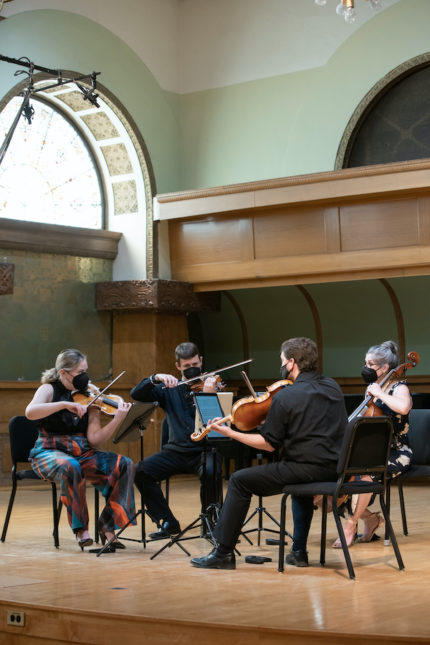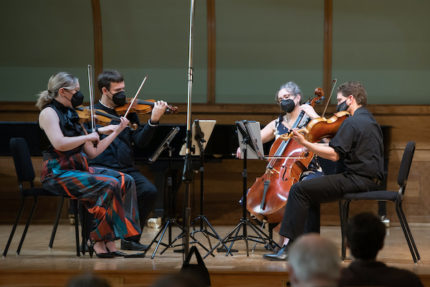Wurtz premiere the clear highlight of American Music Project concert

With conventional concert formats that routinely couch brand-new works between better known (and often, more diligently prepared) warhorses, it’s uncommon for a world premiere performance to be the most memorable high of a given program.
But a concert by the Kontras Quartet of works by American composers at Ganz Hall, presented by the American Music Project on Sunday afternoon, undoubtedly bucked that trend.
Since 2014, the nonprofit organization has sought to expand the canon of contemporary American art music by programming neglected works of the past and commissioning major works by American composers. The project’s latest effort offered Amy Wurtz’s String Quartet No. 3 in its world premiere at Sunday’s concert, which also marked AMP’s first mainstage event since 2016. (AMP was founded by Chicago Classical Review’s Lawrence A. Johnson, who is the organization’s executive director.)
Opening the program was Philip Glass’s Second String Quartet (“Company”), titled after (and written to accompany) a dramatization of Samuel Beckett’s eponymous novella—a slight work, but chock-full of stylish, Glassworks-era writing.
Kontras opened the quartet’s introduction with a measured rubato, flexing into a moderate tempo in the first theme that largely set the pace for the rest of the work. The choice lent an organic feel to Glass’s scoring, but the pedestrian tempo resulted in a largely anodyne and undramatic reading.
Vincent Persichetti’s String Quartet No. 3 provided one of the program’s major tentpoles. A legendary pedagogue who taught such notable figures as Glass and Einojuhani Rautavaara at Juilliard, Persichetti’s remarkable works are sorely under-programmed, making this chamber masterpiece a welcome addition to Sunday’s proceedings.
Though the composer’s early output adhered to early 20th-century neoclassicism, the Third Quartet is a banner work from Persichetti’s middle period that weaves hymnic melodies with more modern aesthetics and evinces the composer’s penchant for meticulous instrumentation and marvelous melodic architecture.
It’s also a fierce and mercurial composition, cast in a single movement yet characterized by a staggering landscape of varied texture and mood. Yet while the Kontras Quartet gave a committed performance, it ultimately fell flat. Such sharp-edged writing calls for a delivery with bite, and while solo contributions shone bright (as with a cello obbligato passage played by Jean Hatmaker), one was left wanting for more fire throughout, especially in the furioso and vivace sections. Even the more tender ensemble moments came off as unpolished as the ensemble wrestled intermittently with intonation in the work’s dense harmonies.
“This kind of program is such a unique opportunity for us, as classical musicians, to work and interact with living composers,” said Kontras cellist Hatmaker in remarks after intermission. This collaboration may well be the secret sauce that was lacking from the program’s first half, as the Kontras Quartet brought sharper insight and more fervent playing to uplift the program’s latter selections.
The fruits of those collaborations were immediately felt in Sacred Traces, written for Kontras by Chicago composer John Elmquist. The work was arguably the most distinctly “Americana”-tinged of the afternoon, characterized by fiddle-tune gestures and slinky themes that swirl about and pass back and forth like partners in a line dance. At its most finely tuned, the Kontras Quartet whirred like a clockwork machine in Sacred Traces’ tightly knitted counterpoint. One wondered where this rhythmic verve had been hiding during the Glass quartet.
Frederick Tillis’s Spiritual Fantasy No. 12 taps into an undoubtedly American sonority, drawing from a rich vein of black American music. The Kontras players were similarly stalwart advocates for the two movements selected for this program. Kontras illuminated the Ellingtonian harmonies of “Nobody Knows the Trouble I See” with Technicolor brilliance, and violist Ben Weber’s soulful affect in the lyrical melody in “Wade in the Water” was an individual highlight.
Other than being the obvious zenith and focal point of the program, Amy Wurtz’s String Quartet No. 3 also served as a perfect summation of the preceding selections. Performed as one movement without pause like the Persichetti, Wurtz’s opus is a narrative peopled by fascinating characters, each more exquisitely realized than the last. And while its harmonic language situates Wurtz in a similar camp as the concert’s other composers, the beguiling renderings are all Wurtz’s own.

The work opens with a cascading double-stop figure, which gives way to a valiant theme that establishes the first violin as the clear protagonist. The extended solo found violinist Eleanor Bartsch wending an utterly virtuosic narrative with clarion tone and technical aplomb over a quivering accompaniment. Each of the supporting characters get their moments in the sun, too — extended solos by second violinist François Henkins, violist Weber, and cellist Hatmaker were each ably delivered and shaded with rich colors. Among the piece’s more ingenious moments is a piquant habanera, anchored by a diabolical bass line in the cello while the viola snapped pizzicato dances with clave-like rhythm.
Throughout the piece, the cascading opening theme returns to comment on the hero’s predicament. At times it’s warm and lush, at others sour and curdled with microtonal harmony, and sometimes looks on with steely detachment. This is urgent, anxious music, wrought with taut but deep-felt emotion and brought exquisitely to life thanks to the Kontras Quartet’s attentive interpretation.
Sunday’s performance marks the second time the American Music Project has publicly advocated for Wurtz’s music, the first being at the inaugural AMP performance in 2014, which featured the world premiere of her Piano Quintet. Sunday’s performance made no secret of why, and one only hopes the Kontras Quartet will follow suit by committing her Third String Quartet to a recording. Based on the enthusiastic response from the audience at Ganz Hall, one can only infer that they would agree.
American Music Project events for the 2022-23 season are yet to be announced. americanmusicproject.net
Posted in Performances


